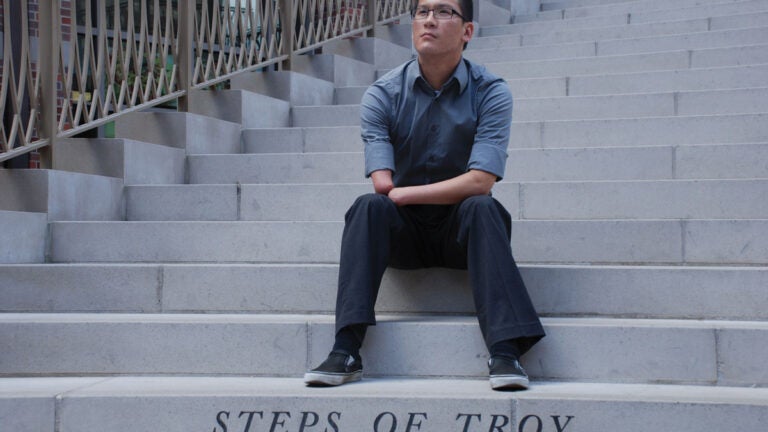
John Lien Margetis / Photo by Pamela Johnson
This Healer Lives Life On His Own Terms
A Trojan inspires his patients with stroke and brain injuries through occupational therapy.
John Lien Margetis ’11, MA ’12, OTD ’13 was born without hands and only partial feet, but sometimes having “limb differences” is an asset. As a Los Angeles occupational therapist who helps people hospitalized after stroke and other serious brain and spinal cord injuries, Margetis embodies resilience for his patients.
Margetis, 27, doesn’t need arm prostheses to move around the intensive care unit—or anywhere else. He enjoys skydiving, snowboarding and road biking. He touch-types on his keyboard and dabbles in art photography.
Yet his life could have turned out much differently.
Margetis’ story begins in an orphanage in Taiwan, where his birth parents reluctantly placed him because they couldn’t give him the tools he’d need to lead a full life. Enter Monique Margetis of Pasadena, California, who saw his baby photo in an adoption newsletter and fell in love.
“He was sitting in an infant seat with a huge smile on his face and his hair standing up about 6 inches on his head,” she remembers. An assistant professor of pediatrics at the Keck School of Medicine of USC and pediatric pulmonologist at Children’s Hospital Los Angeles (CHLA), Monique Margetis already had an 11-year-old biological son and a 4-year-old adopted daughter from Brazil. But the single mom comes from a large family and already knew a lot about prostheses from her father, who developed artificial limbs for combat veterans.
In her mind, there was nothing her son couldn’t accomplish with the help of artificial limbs. She was half right.
In her mind, there was nothing her son couldn’t accomplish with the help of artificial limbs. She was half right.
In what he laughingly describes as “a burst of preadolescent rebellion,” John Margetis rejected his prostheses in 8th grade. As a teen he was mostly interested in using computers, skateboarding and biking, and over the years, occupational therapists had taught him to do these and hundreds of other tasks with and without artificial limbs. He realized he could manage just as well without prostheses.
He competed in soccer and track in high school and at USC earned two bachelor’s degrees before going on to complete master’s and doctoral programs in occupational therapy—all without special accommodations. As a master’s student, he did an elective rotation at CHLA’s hand clinic. The surgeons were so impressed they tapped him to be the speaker at their annual family day for children with hand deficiencies.
Today, he works as a rehab specialist in the neuroscience ICU at Keck Medical Center of USC and clinical assistant professor in the USC Chan Division of Occupational Science and Occupational Therapy. Patients recovering from stroke who are learning to regain the use of their paralyzed limbs often stare when they first meet Margetis, dumbfounded by his obvious physical differences.
“There will be times when you feel confused,” he tells patients, “but your OT is going to be that lighthouse cutting through the fog.”
Many patients later confide that hearing that message from a therapist with no hands feels “incredibly motivating.” It turns out that heart, not hands, makes all the difference.
https://youtu.be/Iwg3dXmk_ew
